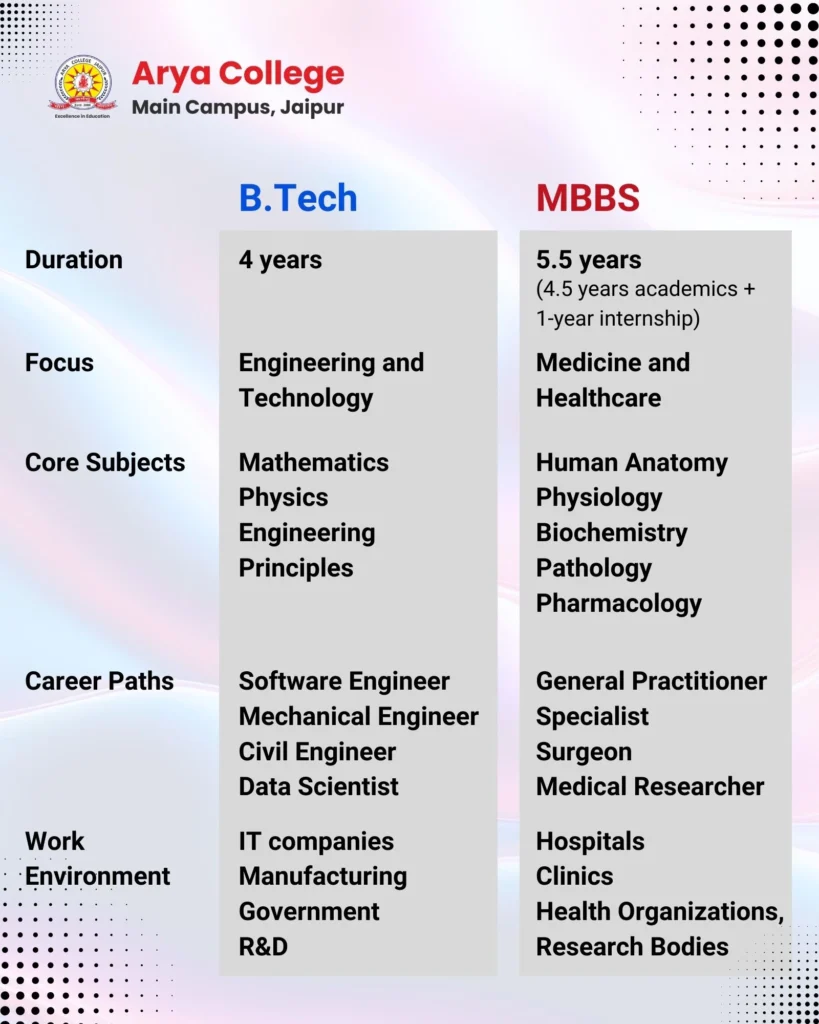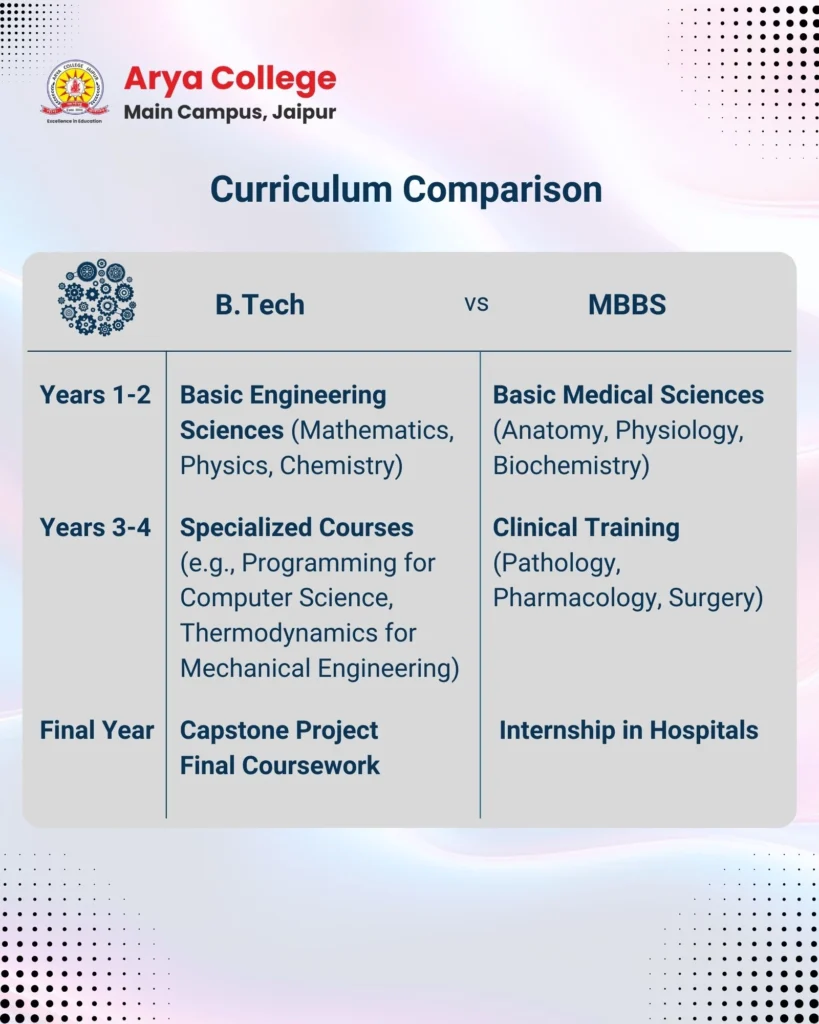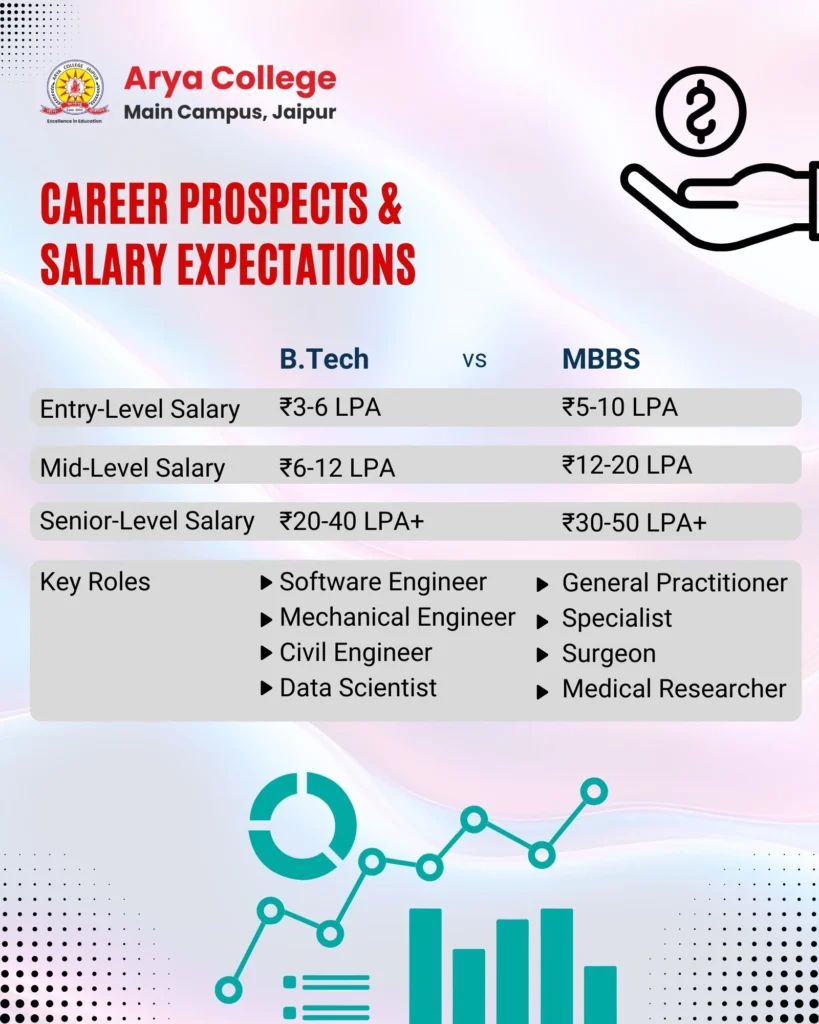What is the Difference Between B.Tech and MBBS?
Choosing your career is said to be the most crucial decision one will make in their life. In regard, especially in India, B.Tech (Bachelor of Technology) and MBBS (Medicinae Baccalaureus, Baccalaureus Chirurgiae) are the most discussed and aspired courses for higher education. Though both lead to different career options, different kinds of educational experiences, and different contributions to society, they target very different interests and skills. Through this blog, we would try to understand some of the major differences between B.Tech and MBBS, helping you identify the best road to take.
It is important for students to make a choice between an engineering and a medical career. Below is the general difference between these two courses.
B.Tech is a four-year undergraduate program that paves the way for a successful career in the field of technical and engineering education. It makes graduates eligible for Computer Science, Mechanical, and Electrical careers, among many other disciplines. MBBS, on the other hand, is a five-year course, including compulsory internship at the end of it; it makes one a medical doctor upon completion. The course content of MBBS deals with human biology, patient care, and medical science.

How MBBS Curriculum Differentiates from B.Tech Curriculum
A comparison of the curricula of the B.Tech and MBBS programs could likewise acquaint the students with the academic demands and focus on the programs. Here are pointers for a comparative analysis:

Curriculum Comparison: B.Tech vs. MBBS
The B.Tech curriculum is math-strong and physics-strong, also science-strong, with MBBS forms being targeted at the biological sciences strength in the curriculum, with clinical skills in the right morning direction; more able in the very important dimension for anybody who is concerned about the health industry.
Why Opt for B.Tech Over MBBS or Vice Versa
There lies the interest of an individual towards either B.Tech or MBBS, with their career goals and the working sector in each of them. This is why you would do one over the other.
If you are passionate about technology, innovation, and problem-solving, be it through IT, manufacturing, or infrastructure, then B.Tech is certainly your calling. In consequence, this degree allows for a smooth transition into fast, dynamic spaces such as that of a software developer, engineer, or data scientist.
On the other hand, if you have a liking toward healthcare, patient care, and human biology, it will be wise to take up MBBS. This line of work gives a fulfilling career being a doctor, through which a person can immensely make the difference and change people’s lives through medical practice and service to health.
When to Opt Between B.Tech and MBBS
At a huge scale, decision time can impact preparation and success in any of the two fields. The section guides when to start thinking about B.Tech or MBBS.
Ideally, one should think of the choice between B.Tech and MBBS at the higher secondary level of education. That means from Grade 10 through 12. This is the stage where students should start identifying inclinations or areas of interest in subjects like biology, chemistry, mathematics, and physics. Probably, relevant extracurriculars, internships, and counseling by career specialists could further help in the process of clarification. Undoubtedly, this stretch is most vital because entrance exams for both B.Tech (like JEE) and MBBS (like NEET) demand very focused preparation.

What Are the Career Prospects After B.Tech vs MBBS?
Career opportunities in the future are a very important determinant while choosing between B.Tech and MBBS. Here is an insight into the job opportunities that both degrees hold.
Career Opportunities between B.Tech and MBBS
B.Tech graduates can easily bridge into most industries, from IT to manufacturing, and even government, whereas MBBS graduates are only applicable mostly in a health care setting, such as hospitals, clinics, or research institutes. In terms of international scope, which again can be found in both, careers also differ.
Topic and Subject Syllabus: What to Expect?
B.Tech and MBBS have program-specific curriculum, as under mentioned. Following is the debrief of the key subject areas for both the programs:
Curriculum of B.Tech
The B.Tech students are exposed to the courses related to Mathematics, Physics, and Chemistry; basic and general engineering sciences dished out during the very first two years; and specialized engineering courses in their chosen branch during the succeeding years. For example:
- Computer Science Engineering: Programming, Data Structures, Algorithms, AI, Machine Learning.
- Mechanical Engineering: Thermodynamics, Fluid Mechanics, Machine Design and Manufacturing Processes.
- Civil Engineering: Renewal and retrofitting of infrastructure, including structural analysis and materials, construction management.
Syllabus for MBBS
Key Subjects learned by MBBS students involve a wide range of medical information:
- Human Anatomy: The study of the structure of the human body.
- Physiology: An understanding of the functioning of the human body.
- Biochemistry: Chemical processes in the body.
- Pathology: Science of diseases and their causes.
- Pharmacology: The study of medicines and how they affect the human body.
- Surgery: A set of methods and practices used to perform operations on patients.
Counts of Time and Structure
B.Tech
- Duration: 4 years.
- Design: Spread over eight semesters with a combination of theoretical lectures, lab activities, and projects.
- Key Milestones: By the end of the first year, students will be assessed through mid-term and end-semester exams.
MBBS
- Duration: 5.5 years (4.5 years of academics + 1-year internship).
- Structure: It includes theoretical classes, practical laboratory, and clinical post work together with an internship to be undertaken in hospitals, which is a stringent criterion of 100.
- Key Milestones: Clinicals, annual exams, and a last year of internship when students are interns in hospitals.
Procedure for Admission Process: Newly Register for the Course
B.Tech Admission Process:
- Admission Exams: Generally students have to clear admission examinations like JEE Mains, JEE Advanced, or state-level engineering examinations.
- Eligibility: 10+2 with Physics, Chemistry, and Mathematics as core subjects.
- Criteria: Admission is based on the scores of the entrance examination, and in some, the marks of 10+2 are considered.
Admission Procedures for MBBS:
- Entrance Exams: NEET-UG is the long form of National Eligibility cum Entrance Test; it is that big exam for MBBS admissions in India.
- Eligibility: Pass in 10+2 with Physics, Chemistry, and Biology as main subjects.
- Inclusion Criteria: Admission will be based on NEET test scores, followed up by counseling.
Career Prospects: What Lies Over the Horizon?
Job Opportunities after B.Tech:
- Key Role: Graduates with a B.Tech degree have huge employment scope, where they can get settled in various diversified industries.
- Software Engineer: Daisy-chains software application and system software designs.
- Mechanical Engineer: Construction and design of machinery and tools.
- Civil Engineer: In charge of planning, designing, and overseeing construction works.
- Data Scientist: Makes complex business data clear and insightful for business decision-making.
- Entrepreneur: Initiating a business in a tech-related field.
Career Opportunities After MBBS:
The professional doctors from these graduates of the MBBS program may have the following as their areas of responsibility:
-
- General Practitioner: Offers basic health care diagnosis in usual diseases.
- Specialist: Experienced advanced specialization based on Specialty in undergraduate studies in Cardiology, Neurology, or Oncology.
- Surgeon: Performing surgeries and operations to treat injuries or illnesses.
- Medical Researcher: To contribute to research that allows a higher level and more options in medical treatments.
Salary Expectations: Reinforcement
Salary Projections of B.Techs:
- Fresher Level: ₹3-6 LPA (depends on engineering stream and company).
- Mid-Level: ₹6-12 LPA (varies with experience and position).
- Senior-Level: ₹20-40 LPA and above, especially in managerial or specialist roles.
Salaries Anticipated by MBBS:
- Fresher Level: ₹5-10 LPA (at an internship or entry-level doctor).
- Mid-Level: ₹12-20 LPA (post specialisation).
- Senior-Level: ₹30-50 LPA or more (in case of experienced doctors and specialists in reputed hospitals).
Work Environment: Where Do You Find Yourself Working in?
Industries in which human-robot speciality is of the utmost value: information technology companies and manufacturing companies.
Nature of Work: Office work with some branches conducting site visits occasionally, such as Civil and Mechanical Engineering.
Business hours: 9-5, though there can be a bit of stretching for things like projects with short deadlines.
MBBS Working Atmosphere :
Industries: hospitals, clinics, health organizations, research bodies, NGOs.
Nature of Work: Hospital or clinic-based work, possibly including work conducted during the night, on call, and in an emergency case.
Work Hours: The work hours can be very irregular, especially when one takes into account the time needed for the specialization and area of work.
Why Most Students Find the Selection Between B.Tech and MBBS into College Very Confusing
The main problem or obstacle for choosing among B.Tech and MBBs is basically due to a fact in which both disciplines consist of a great difference by way of nature, workload, and different career outcomes or prospects. Both academic domains require appropriate balancing between the domain of interest and strongly developed potentials on the part of the students. Conclusion: Is B.Tech a better path compared to MBBS?
Conclusion
The career-changing decision-maker plague: shall I pick B.Tech or go for MBBS? With technology working and problem-solving skills, along with the ability of innovation, if you are of a kind who is positive, then B.Tech offers myriad career opportunities in numerous engineering and technology sectors. However, MBBS best suits people inspired by health-care-related issues, patient care, and sciences, with a bright career in medicine at the end of it all. Your picked major has got to be something that interests and influences your strengths and what you absolutely want to do in the future.





